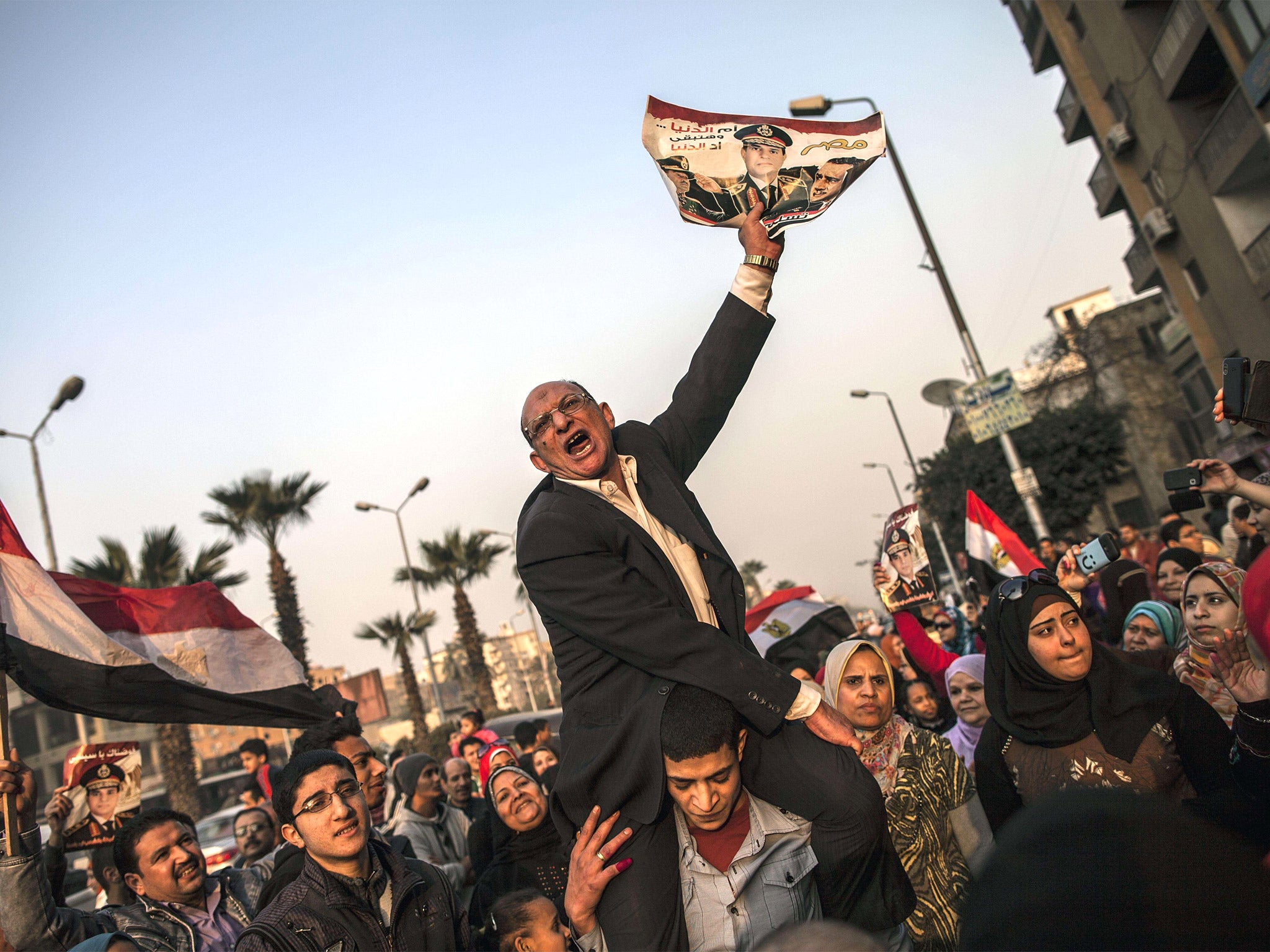Egypt votes for a new constitution - and to legitimise an army coup
Observers say the referendum is an attempt by the authorities to secure a nationwide stamp of approval for the coup that unseated former President Mohamed Morsi last July

Your support helps us to tell the story
From reproductive rights to climate change to Big Tech, The Independent is on the ground when the story is developing. Whether it's investigating the financials of Elon Musk's pro-Trump PAC or producing our latest documentary, 'The A Word', which shines a light on the American women fighting for reproductive rights, we know how important it is to parse out the facts from the messaging.
At such a critical moment in US history, we need reporters on the ground. Your donation allows us to keep sending journalists to speak to both sides of the story.
The Independent is trusted by Americans across the entire political spectrum. And unlike many other quality news outlets, we choose not to lock Americans out of our reporting and analysis with paywalls. We believe quality journalism should be available to everyone, paid for by those who can afford it.
Your support makes all the difference.A long-awaited vote on Egypt’s new constitution started with a bomb, continued with clashes that left at least four people dead and looks set to end with victory for a government that has done all it can to prevent any other outcome.
The referendum is ostensibly a straightforward plebiscite on the country’s new national charter – the document that would replace a previous constitution drafted under Muslim Brotherhood rule during the winter of 2012.
But in reality many observers have billed it as an attempt by the Egyptian authorities to secure a nationwide stamp of approval for the coup that unseated former President Mohamed Morsi last July.
Perhaps more importantly, the vote – set to be concluded on Wednesday – is being seen as a prelude to a presidential bid by General Abdel Fattah al-Sisi, Egypt’s popular but divisive army chief, in elections due to follow later this year.
Robert Springborg, a US-based expert on Egypt’s military, told The Independent that he believed the referendum was little more than a vote on the legitimacy of the army’s putsch against the Brotherhood last year.
“Those who made the coup are responsible for the constitution,” he said. “The two are basically inseparable in the minds of Egyptians.”
General Sisi himself – whose predilection for designer shades occasionally lends him the aura of a South American demagogue – has appeared more and more amenable to the idea of running.
According to the website of the state-owned Al Ahram newspaper, he declared in a recent military seminar that if he were to put himself forward, it would be “at the request of the people”. In previous statements he has either ruled himself out or appeared far more ambiguous.
The idea of Egypt’s former spy chief elevating himself from putsch leader to the presidential palace may horrify lawmakers in the West. But on the streets of Cairo – which for three years have echoed to the sound of tear gas, gunfire and burning vehicles – there is widespread support for the move.
Aboul Fadil Younis, a 58-year-old sports coach, gave a cheerful thumbs-up when asked how he would react to a Sisi presidency.
He said that the army chief was “the solution to all our problems” – including the irhaab, or terrorism, which many Egyptians are convinced is being deployed against the state by the ousted Muslim Brotherhood.
“This referendum will be the last breath of the Brotherhood,” he said.
Mr Younis was standing close to the scene of today’s bomb explosion, which targeted a courthouse in the working-class neighbourhood of Imbaba. Nobody was injured, but the attack will give credence to the view held by many Egyptians that the country is in need of a strongman leader after years of chaos and unrest.
There have been scores of militant attacks on police targets and army checkpoints since last summer. The most high profile recent attack was a deadly bombing last month in the Nile Delta city of Mansoura, claimed by a fundamentalist group based in north Sinai.
Egypt faces a very real terrorist threat, but so far there has been no direct evidence of Brotherhood involvement in such attacks. Nevertheless, thousands of the group’s members have been arrested and last month the Egyptian authorities designated it a terrorist organisation.
As lines of voters began forming this morning, not a single person interviewed by The Independent said they would vote down the constitution. Several said one of the main things they were looking for was stability.
“Today is like a festival,” said Ahmad Salahadin, a 55-year-old businessman who was lining up to cast his ballot. “After today, the country will be able to go forward in a better way.”
Join our commenting forum
Join thought-provoking conversations, follow other Independent readers and see their replies
Comments